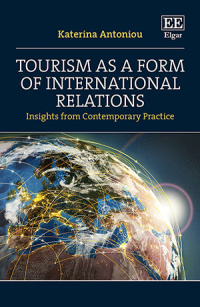
Hardback
Handbook on Crisis and Disaster Management in Tourism
Recent global crises such as the COVID-19 pandemic have further emphasised the need for improved disaster management within the tourism industry, and with this in mind, the Handbook on Crisis and Disaster Management in Tourism fully addresses the importance of crisis and disaster readiness. This erudite Handbook brings together contributions from both leading tourism practitioners and scholars of a variety of disciplinary backgrounds, ranging from economics to hospitality, to showcase collaborative approaches to destination and business recovery.
More Information
Critical Acclaim
Contributors
More Information
Recent global crises such as the COVID-19 pandemic have further emphasised the need for improved disaster management within the tourism industry, and with this in mind, the Handbook on Crisis and Disaster Management in Tourism fully addresses the importance of crisis and disaster readiness. This erudite Handbook brings together contributions from both leading tourism practitioners and scholars of a variety of disciplinary backgrounds, ranging from economics to hospitality, to showcase collaborative approaches to destination and business recovery.
Taking a global approach to crisis and disaster management research, this comprehensive Handbook uses a wide variety of international case studies from both the Global North and South. Pressing issues, such as climate change and the need for improved communication between the tourism industry and government bodies, are examined through multiple critical lenses from the theoretical to practical. Significantly, chapters explore recent events to illustrate the importance of the global transition to net zero and efficient disaster management and recovery, such as Australian bushfires and growing challenges to Pacific Island tourism.
Providing in-depth analyses of disaster management strategies, this Handbook will be an essential resource for students and researchers focusing on tourism management and climate change mitigation. It will additionally be beneficial for tourism industry practitioners seeking to understand practical applications of crisis and disaster management methods.
Taking a global approach to crisis and disaster management research, this comprehensive Handbook uses a wide variety of international case studies from both the Global North and South. Pressing issues, such as climate change and the need for improved communication between the tourism industry and government bodies, are examined through multiple critical lenses from the theoretical to practical. Significantly, chapters explore recent events to illustrate the importance of the global transition to net zero and efficient disaster management and recovery, such as Australian bushfires and growing challenges to Pacific Island tourism.
Providing in-depth analyses of disaster management strategies, this Handbook will be an essential resource for students and researchers focusing on tourism management and climate change mitigation. It will additionally be beneficial for tourism industry practitioners seeking to understand practical applications of crisis and disaster management methods.
Critical Acclaim
‘This Handbook provides an excellent synthesis of theories, concepts and practical management strategies to effectively manage crises and disasters in tourism. A focus on rapidly emerging crises, such as climate change and emerging technology are timely and especially important. This book is a must read for students, researchers and industry.’
– Brent W. Ritchie, The University of Queensland, Australia
‘At a time when the world is peppered with crises, some local, some regional and many global, this Handbook provides a platform for academics and practitioners to understand and build on the implications of such crises. This is a timely and much needed addition to the literature on disaster management.’
– John Fletcher, Bournemouth University, UK
– Brent W. Ritchie, The University of Queensland, Australia
‘At a time when the world is peppered with crises, some local, some regional and many global, this Handbook provides a platform for academics and practitioners to understand and build on the implications of such crises. This is a timely and much needed addition to the literature on disaster management.’
– John Fletcher, Bournemouth University, UK
Contributors
Contributors include: Jerome Agrusa, Sergio Alvarez, Frida Bahja, David Beirman, Francesco Catarsi, Connor Clark, Nick Cradock-Henry, Aviva Cui, Terry de Lacy, Katharina Dressler, Stephen Espiner, Abrar Faisal, Jo Fountain, Alan Fyall, Ancy Gamage, Emmanuel Gamor, Richard Gordon, Robert Harding-Smith, Sarojini Imran (Jini), Kanapot Kalnaovakul, Prathana Kannaovakun, Devi Roza Kausar, Cathrine Linnes, Gabrielle Lindsay-Smith, Evelyn G.Y. Loh, Bob McKercher, Athula Naranpanawa, Hakimeh Nasiri, Van Khanh Nguyen, Lori Pennington-Gray, Girish Prayag, Bruce Prideaux, Pornpisanu Promsivapallop, Joanne Pyke, Chloe Riley, Giulio Ronzoni, Dini Rosmalia, Ashley Schroeder, Marcus L. Stephenson, Nancy Stevenson, Masato Takamatsu, Michelle Thompson, Dallen J. Timothy, Bert “Bow-Thai” van Walbeek, Kanchana Wickramasinghe




